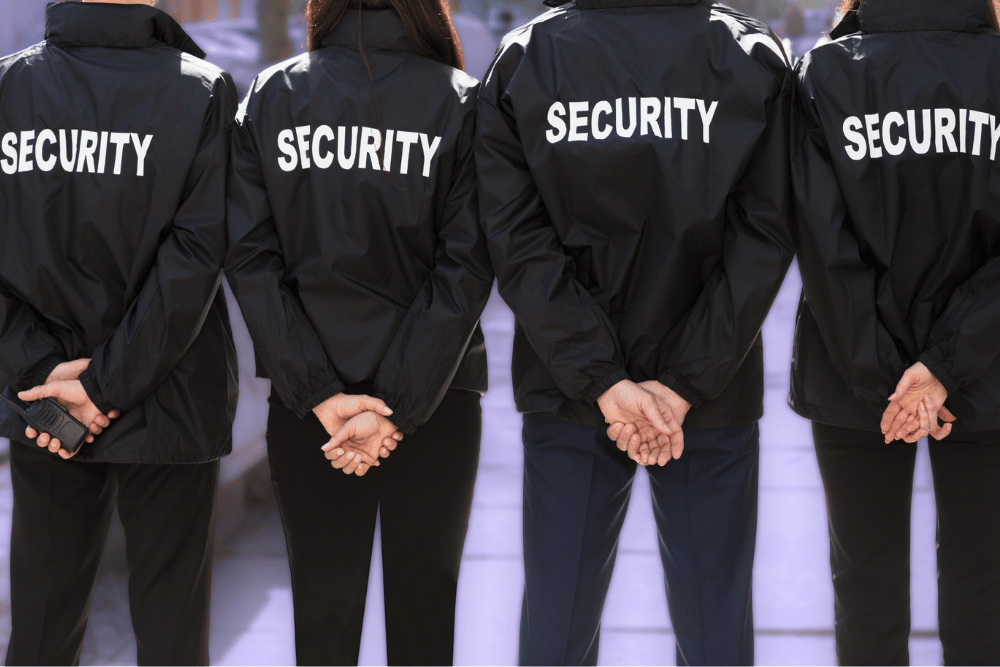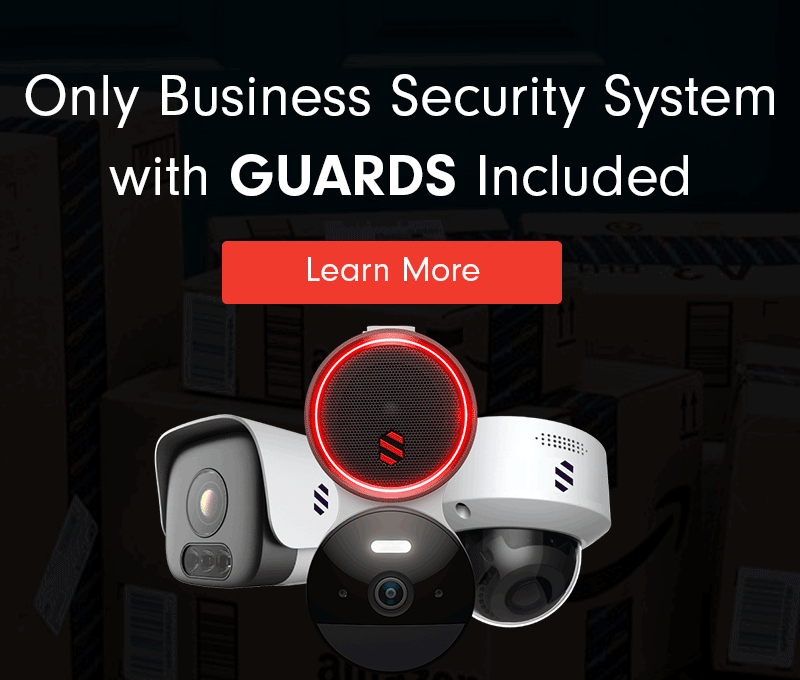What Security Guards Can and Can’t Do

Security guards are ubiquitous in malls, schools, and countless other spaces. Yet, their role remains surprisingly mysterious. For business owners, entrusting their company’s safety to these uniformed watchdogs hinges on understanding their authority. For the public, encountering a stern “STOP!” raises the unnerving question: just how much power do these guardians have? What can security guards do legally? What can’t they do?
You’re not alone in this confusion. The line between a friendly “hello” and a forceful intervention at the hands of a security guard can feel alarmingly blurry.
The terrain may be murky, but it’s possible to separate fact from fiction. Security guards operate within an unmistakable legal landscape. While often mistaken for police officers, security guards have powers that are far more limited. There’s a very clear distinction between what security guards can and can’t do.
What Security Guards Can and Can’t Do
Security guards play a crucial role in safeguarding people and property. However, understanding their legal and liability-related limitations is imperative. For them, their employers, and the general public.
One of the key distinctions between security guards and police officers lies in their legal authority. Unlike law enforcement, security guards operate under private employment, and the law limits their powers. In the vast majority of cases, they’re observers and deterrents, not law enforcement officers.
So, what can private security guards—those vigilant figures patrolling your local mall—actually do?
In short, guards can act as deterrents and they can intervene to stop a crime-in-progress. But, as with so much in life, the devil is in the details.
Observe and Report
If we had to boil down the job of security guards to 3 words or less, it’d be “observe and report.”
Their keen eyes watch for suspicious activity, from shoplifting to vandalism. Think of them as human security cameras, logging potential threats and relaying them to the authorities when necessary.
Say a heated argument erupts near the food court. Security guards can step in as mediators, de-escalating the situation with calm communication. What about using force? Only as a last resort, and even then, it must be proportional to the threat.
But remember, they can’t make arrests themselves.
Can a Security Guard Detain You?
The answer is nuanced.
Security guards can detain individuals for a reasonable amount of time if they suspect criminal activity. But don’t confuse this detention with an arrest.
So if security guards catch a shoplifter red-handed pilfering a new jacket, they can hold the thief until the police arrive. But here’s the catch: detention must be reasonable and brief. Think more along the lines of “holding the elevator door” for the cops, not locking the suspect in a back room for hours.
Unlike police officers, security guards lack the authority to make formal arrests.
Can a Security Guard Ask You to Leave?
The short answer? Yes.
Guards are hired to protect a certain area, and it’s their job to keep the property and any personnel present safe. They can ask you to leave the area, stop loitering, or detain you for trespassing.
Need to access a restricted area? Security guards can ask for identification to verify your credentials and block access if you are not authorized. But discriminatory practices are a big no-no. They must treat everyone with respect, regardless of their appearance or background.
However, they have no jurisdiction if you’re in a public space and not breaking any laws.
Can Security Guards Use Force?
Yes. Within reason.
Security guards are expected to try other methods first to de-escalate the situation, but they are authorized to use justified and reasonable force in the performance of their duties.
But—as is the case for everyone—they must also be prepared to defend that decision to the authorities.
Can a Security Guard Make a Citizen’s Arrest?
Can a security guard arrest you? Not in a traditional sense. That right rests with the police.
However, a security guard can make a citizen’s arrest under certain circumstances. It’s important to remember that their powers differ from those of police officers, and there are specific restrictions on when and how they can do so.
General Citizen’s Arrest
In most jurisdictions, any private citizen can make a citizen’s arrest for a crime they believe is being committed in their presence. However, this typically requires witnessing the crime firsthand and having a reasonable belief that the person is guilty.
Security Guard Citizen’s Arrest
Security guards, despite their uniforms, are still private citizens. Therefore, they can make a citizen’s arrest under the same rules as any other citizen.
However, their authority stems from the property they are hired to protect. This means they can generally only make a citizen’s arrest for crimes committed on the property they are responsible for. They can also make a citizen’s arrest for crimes not directly on the property if they reasonably believe the crime will affect the safety of the property or people on it.
Important restrictions:
- Security guards should only use reasonable force when making a citizen’s arrest. Excessive force can lead to lawsuits and other legal consequences.
- They cannot detain someone for an unreasonable amount of time. Generally, they should hold the person until the police arrive, which should be done promptly.
- Security guards should know the specific laws and regulations in their jurisdiction regarding citizen’s arrests. These laws can vary by location.
Security guards must receive proper training on making a citizen’s arrest and the use of force. This will help them avoid legal trouble.
Remember, this can be a complicated legal matter. It’s important to be aware of the limitations and exercise caution in such situations.
Can a Security Guard Search Your Property?
No. At least, not without your permission.
Security guards can’t search you or your possessions without your consent. If they ask, you’re legally entitled to refuse.
However, if they believe you’ve committed a crime or have stolen property in your possession, they can detain you until the police arrive. And then it’s another story.
Can a Security Guard Use a Weapon?
Yes. Guards can usually carry and use weapons such as a nightstick, taser, or even a gun, provided its use can be described as “reasonable force” in the detainment or intervention of a crime. Obviously, guards must follow all local and state laws.
It’s worth noting that many businesses are reluctant to provide weapons for their security guards because of the increased risk of liability and litigation. Even improperly used handcuffs can cause injury.
Liability and Imperfections
While security guards are a valuable asset, they are not infallible. Breaks, human error, and the inherent imperfections of any human-driven system can create vulnerabilities. Business owners need to recognize these shortcomings and supplement security measures accordingly.
Don’t be fooled by their stoic presence. Security guards are human, and human error is inevitable. From miscommunication to lapses in judgment—to say nothing of the high cost—these vulnerabilities highlight the limitations of only using onsite guards for security and safety.
So, what’s the takeaway? Respect security guards for their role in maintaining order, but recognize their limitations.
They’re not superheroes, and relying solely on them for absolute security is unrealistic. Businesses need a multi-layered approach, combining technology, proper training, and clear communication about the guards’ role within the community.
So, is hiring onsite security guards worth it? Maybe, but there’s a better solution.
Deep Sentinel and the Future of Security
What if there was a way to supercharge a security guard’s abilities, ensuring a faster, more proactive response to threats? That’s where Deep Sentinel’s camera monitoring services step in.
Imagine a business security system that blends the sharp eyes of AI-powered cameras with the immediate intervention of a surveillance security guard. Deep Sentinel’s technology cuts through false alarms, identifying genuine threats and escalating issues to professional guards who intervene and dispatch the authorities. No more waiting for sirens or hoping for a timely patrol. The response is immediate, the communication is clear, and the potential for crime is drastically reduced.
Deep Sentinel doesn’t replace the vigilance of a human guard. It amplifies it.
Explore the power of live video monitoring with Deep Sentinel. Sometimes, the greatest protection lies in watchful eyes and a swift response.
Need a Solution that Prevents Crime?
Deep Sentinel is the only security technology that delivers the experience of a personal guard on every customer’s home and business. Visit deepsentinel.com/business or call 833-983-6006

